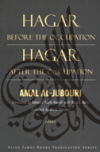Hagar Before the Occupation Hagar After the Occupation
In a series of before-and-after poems, Amal al-Jubouri describes the changes in day-to-day action and mood in Baghdad and greater Iraq after the invasion by American forces and the fall of the Ba’ath Party in 2003.
In a series of before-and-after poems, Amal al-Jubouri describes the changes in day-to-day action and mood in Baghdad and greater Iraq after the invasion by American forces and the fall of the Ba’ath Party in 2003.
And she does this with much honesty and grace. In some poems, the Ba’ath reign is cast with the peculiar nostalgia that follows in the wake of totalitarian collapse—this is from “My Mother After the Occupation”:
Even her prayers become a hymn
to chaos:
………………………
We’re sick of you, Democracy
There used to be one president
There used to be one fear
Likewise, the effect of the occupation allows soccer fans to “cheer and cheer and cheer” (while before “even our thrill was controlled”), but otherwise “Freedom After the Occupation” is
Auctioned off to the highest bidder—
revenge
………………………
Sectarian Religion, Politics
and the country next door raises the price on your head
An average American reader may find Hagar Before the Occupation / Hagar After the Occupation a difficult read, even as translators Rebecca Gayle Howell and Husam Qaisi take great pains to ensure that few cultural and literary cues are lost in the conversion. But as with any difficulty based on unintended ignorance, it’s well worth two or three readings—with one finger in the Notes and Wikipedia within arm’s reach—in order to encourage a more sympathetic and full understanding for the citizens of Iraq.
Late December 2011, the remaining combat troops of the United States military exited Iraq after nearly a decade of invasion and occupation; yet it’s never too late to examine, and hold to heart, how war continues to affect a community for the good, bad and ugly.





